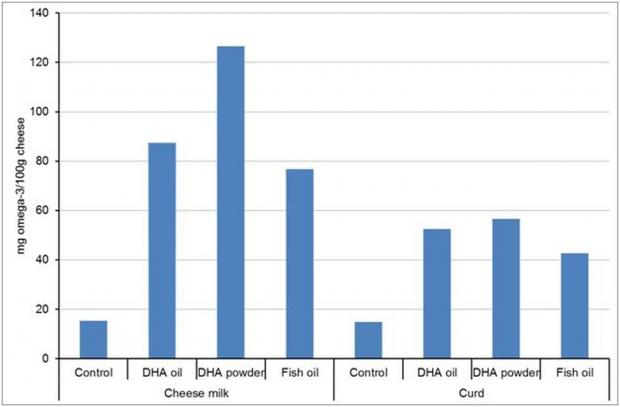It is well known that omega-3 fatty acids are essential in our diet to maintain good health, but less than a third of the UK population regularly eat oily fish - the best source of long chain omega-3 fatty acids. Increased consumption of these fatty acids can have a range of health benefits for example impacts on blood pressure, asthma, arthritis, diabetes and other chronic conditions.

Dairy chemistry research in the Food Research Branch in AFBI has focused on increasing the content of long chain omega-3 polyunsaturated fatty acids in milk and dairy products with applications at both farm and factory level. Nutritionists have identified the potential for foods which are consumed in large quantities, such as dairy products, to act as transport mechanisms for nutrients such as fatty acids and vitamins. Consumption of these enhanced dairy products could therefore benefit the health of the UK population, and provides a valuable opportunity to add value to milk as a “high health” product.
Increasing omega-3 fatty acid content in milk
A study was recently conducted to determine the effect of supplementing the diet of dairy cows with several levels of an algal product high in the long chain fatty acid docosahexaenoic acid (DHA). The trial involved offering dairy cows either 0, 75, 150 or 225g supplement per cow per day along with 10kg concentrate and grass silage. Milk samples were collected weekly for analysis of fatty acids, milk fat, protein and lactose with milk yields recorded daily.
Levels of DHA in milk increased substantially with inclusion of the algal supplement, from 0.18 mg DHA/g milk fat in milk from cows offered the control diet (zero algal supplement) to 3.26 mg DHA/g milk fat in milk from cows offered 225g/day of algal supplement. Milk yield was not affected by the dietary treatments but milk fat and protein concentrations were reduced with increasing levels of algal supplementation. Milk fat concentration declined from 4.11% in control milk to 3.01% in milk from cows offered 225 g/cow/day algal supplement, while milk protein concentration declined from 3.22% in control milk to 3.03% in milk from cows offered 225 g/cow/day algal supplement.
The omega-3 enriched milk was subsequently processed into an omega-3 enriched Greek-style high fat yoghurt with no adverse effects on yoghurt processing characteristics or microbial safety and no evidence of oxidation over a 3 week storage period at 4⁰C. Sensory evaluation found no difference between the control and omega-3 yoghurt on each of two production days, so the omega-3 enriched product tasted just as good as the control product.
Omega-3 fortified Cheese
A second study investigated the production of omega-3 fortified reduced fat cheddar cheese. This was achieved by incorporating three supplements high in DHA. Two of these supplements were algal oil products - one in an oil form and one in a powder form, and the third supplement was a microencapsulated fish oil product. The supplements were added at two levels, representative of the regulatory levels for labelling as “source of “or “high in” omega-3 fatty acids.
During manufacture the supplements were added at two stages: either into the cheese milk before culture or rennet addition, or into the cheese curd before pressing. Control cheeses which contained no added omega-3 fatty acids were also produced.

Further studies were conducted to characterise the sensory acceptability of the omega-3 fortified mature cheddar cheese. Panellists in the Sensory Evaluation Unit at AFBI Newforge evaluated both the fortified omega-3 cheese and “control” cheese finding both cheeses “moderately acceptable” to “extremely acceptable” with no difference between them. This is an important result as reduced fat “healthier” cheeses have historically displayed poorer eating quality.
Conclusions:
These results indicate that there is clear potential to increase the concentrations of long chain omega-3 fatty acids in dairy products, through inclusion of omega-3 containing supplements at various stages of production from the diet of dairy cows to later stages in industrial processing. The next stage in the process is to take these studies further, to evaluate the effect of consuming high omega-3 dairy products on health of consumers. Nonetheless, the results of these studies show that there is real potential to enhance the nutritional value of milk, yoghurt, cheese and other dairy products, thereby adding value to milk as a ‘high health’ product.
Notes to editors:
AFBI carries out high quality technology research and development, statutory, analytical, and diagnostic testing functions for DAERA and other Government departments, public bodies and commercial companies.
AFBI's Vision is “Scientific excellence in Northern Ireland … serving the world”.
All media enquiries to AFBI Press Office
Latest news
- AFBI issues Nematodirus warning – Spring 2025 11 April 2025
- Managing Nature Based Risks to the UK Economy and Opportunities for Green Finance 08 April 2025
- AFBI Hillsborough host AERA committee 27 March 2025
- The Omics Days Conference 27 March 2025
